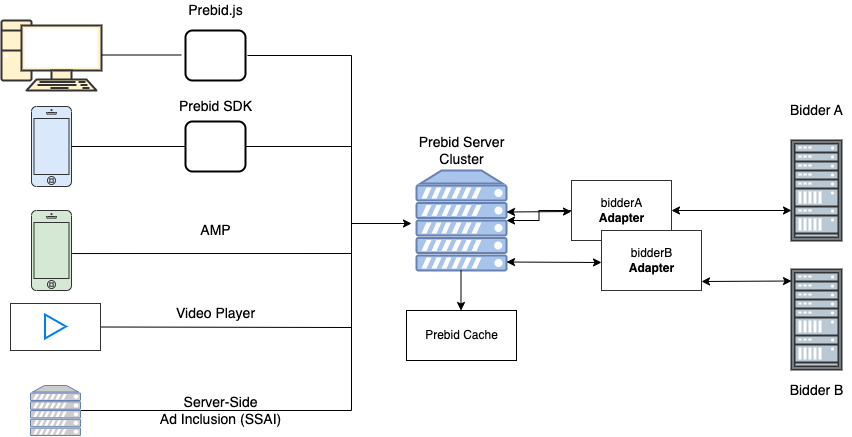
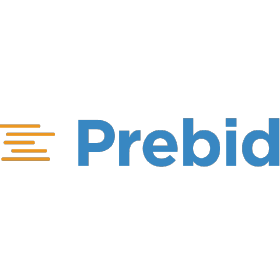
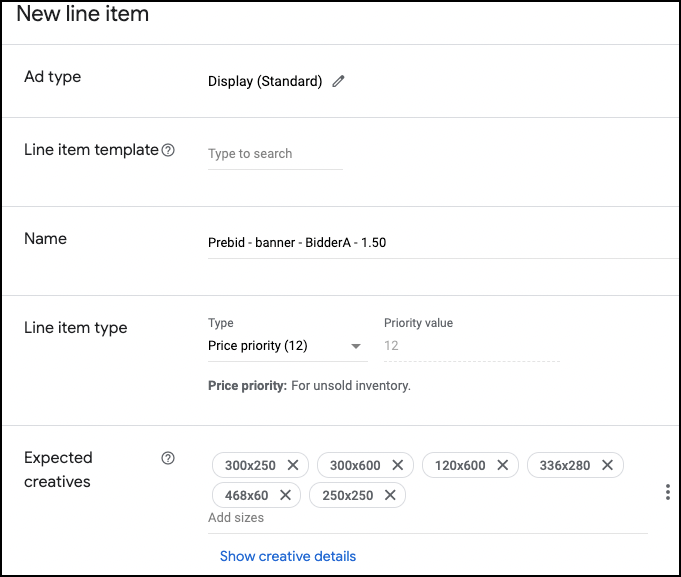
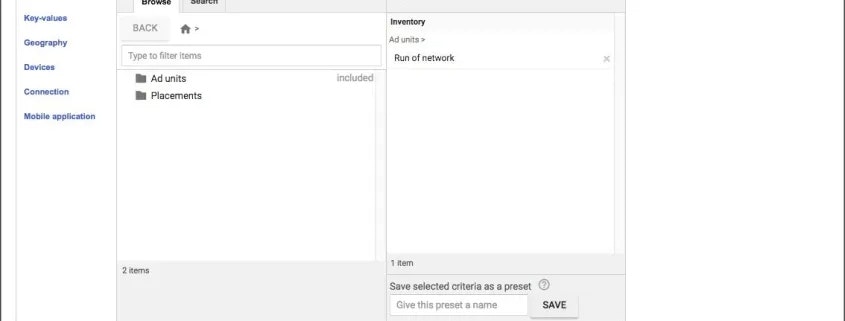


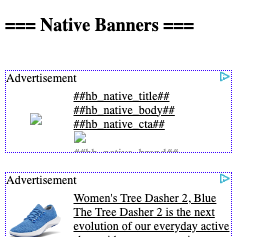

Introduction
Welcome! This document will explain integrating Commerce Grid into your existing Prebid Server.
If you are starting from scratch, please refer to Prebid’s documentation for Prebid Server here.
To enable Criteo as a Prebid Server Bidder, you must already set up a Prebid Server instance. You may be using a hosted managed service, such as the solutions provided by providers here, or you may host your own prebid server instance.
To learn more about how Prebid Server works, see Prebid documentation here.
Requirements
Prebid Server:
- For GO : v0.256.0 or higher (as we added iframe based user-sync in v0.256.0).
- For JAVA : v1.121.0 or higher (corresponds to the GO version).
A list of identifiers for each ad placement and/or format you have available on the page.
Registering the Criteo bidder
If you are using a Prebid managed service, the enablement and params may be set up in the UI of the provider instead of through code directly.
For Criteo Commerce Grid params, you will need to enter the networkId which can be provided by your Criteo Commerce Grid contact.
Registering the CGrid Criteo bidder - Publisher ID setup
Each inventory group will be tied to a Publisher ID. Publisher ID can be a unique ID provided by the publisher and mapped on Criteo side, or by default we will use the ID provided for ads.txt.
Third-Party Wrappers
If you are using a third-party host or wrapper solution (Microsoft Prebid Server Premium, Magnite Demand Manager or PubMatic OpenWrap), you may have to set up your publisher id and network id in your user management interface.
Self-hosted or other cases
If using your own self-hosted Prebid Server instance or another solution, you should pass the publisher id under the OpenRTB field app.publisher.id/site.publisher.id.
Note that as of now networkId is a required parameter to pass along with publisher id, through app.publisher.ext.networkId/site.publisher.ext.networkId. See example.
Registering the CGrid Criteo bidder - Ad Unit ID Setup
The information below details how to pass CGrid Ad Unit IDs instead of Publisher IDs. Integration below only needs to be used for cases where publisher ID integration is not sufficient and ad unit mapping is required.
Third-Party Wrappers
If you are using a third-party host or wrapper solution (Microsoft Prebid Server Premium, Magnite Demand Manager or PubMatic OpenWrap), you may have to set up your ad unit id (uid) and network id in your user management interface.
Self-hosted or other cases
If using your own self-hosted Prebid Server instance or another solution, you should pass the publisher id under the field imp.ext.bidder.uid.
Note that as of now networkId is a required parameter to pass along with publisher id, through app.publisher.ext.networkId/site.publisher.ext.networkId. See example.
Global Placement ID (GPID)
As documented in the Prebid documentation, you will need to register Criteo's bidder for each of your ad units. You will find an example to the right.
Please include the Criteo bidder and the networkId provided by your Commerce Grid Account Manager on the top of the bids array for the respective adunit.
User ID Collection
As documented in the Prebid documentation, Criteo Commerce Grid collects all IDs generated by Prebid User ID modules, including SharedID and other third-party ID solutions.
If you are using SharedID, please consider implementing SharedId First Party endpoint to make the ID more persistent.
To enrich the bid request data with user IDs not available via these modules (first-party user IDs, third-party IDs, or hashed emails, for instance), please use pbjs.setBidderConfig() to pass an eids array as explained in the below sections.
The eids field should be an array of OpenRTB EIDS objects.
User ID Collection - User Syncing
Proper user matching is crucial to make a Prebid Server connection successful. We support both redirect-based and iframe-based user sync, so to ensure optimal user matching you can leverage either or both of them.
Links to our bidder and user sync endpoints can be found in our YAML file: https://github.com/prebid/prebid-server/blob/master/static/bidder-info/criteo.yaml
Note: In order for user sync to work, we will need to allowlist your host to call our sync endpoints, therefore please reach out to your technical account manager and share your host so we can activate on our side.
User ID Collection - Criteo Id Module
Criteo Id Module is a lightweight identity module which allows Criteo to grab the Criteo Id which can be passed to exchanges. Implementing this module will improve user match rates.

User ID Collection - Prebid.js 6.23+ versus older versions
The below examples on the right correspond to the supported way to pass the "eids" array on Prebid.js 6.23+, including Prebid.js 7, namely via "ortb2.user.ext.data.eids".
On Prebid.js 6.23+, our bid adapter also supports "ortb2.user.ext.eids" which corresponds to the OpenRTB standard.
User ID Collection - Hashed Emails
Use the function pbjs.setBidderConfig() providing the data below (examples on the right):
(optional) source: your domain or the domain of the solution operating on your behalf
id: the hashed email
atype:
3ext.stype: hashing algorithm used:
hemsha256,hemmd5,hemsha256md5. Please refer to the next section for details on hashing formats.
HASHING FORMATS
The hashing should be the users' email address:
Encoded in UTF-8
Trimmed of any white space (eg: "test@criteo.com " should become "test@criteo.com")
Converted to lowercase
Hashed with MD5 or SHA256 or SHA256(MD5) & output as ASCII text
Example:
Type: String
Original Email: john.doe@gmail.com
SHA256: 375320dd9ae7ed408002f3768e16cb5f28c861062fd50dff9a3bff62e9dce4ef
MD5: e13743a7f1db7f4246badd6fd6ff54ff
SHA256 of MD5: 000e3171a5110c35c69d060112bd0ba55d9631c7c2ec93f1840e4570095b263a
Helpful links: https://www.miraclesalad.com/webtools/md5.php and https://www.miraclesalad.com/webtools/sha256.php
User ID Collection - Hashed Phone Numbers
Use the function pbjs.setBidderConfig() providing the data below (examples on the right):
(optional) source: your domain or the domain of the solution operating on your behalf.
id: the user data
atype:
3ext.stype:
pnsha256
HASHED PHONE NUMBERS
Criteo uses SHA256 as a hashing method. The expected underlying phone numbers format is trimmed E.164 format, including the country code, without the leading "+" sign (so only 15 digits, at most): sha256(internationalPhoneNumber.replaceAll(/[^0-9]/g, "")).
Example:
1 (234) 567-8910 → sha256(12345678910) → 63640264849a87c90356129d99ea165e37aa5fabc1fea46906df1a7ca50db492
81-12-3456-7891 → sha256(811234567891) → d9825fb05347d3c910fc5202c0c20d07a87b791cc643c6f2d70402394a849540
02 1234 5678 → sha256(0212345678) → 826f54894e28f3f1795f3c5e3335cf98709c5d5b38b3f9c6d72467d491f032df
+33 1 40 40 22 90 → sha256(33140402290) → fda66831d0cb0eb4bffb21bc795308d69921c211c57be0ae15702071e3b9e988
User ID Collection - First Party IDs
Use the function pbjs.setBidderConfig() providing the data below (examples on the right):
source: your domain
id: the user identifier
atype: Must be
1for cookie/device-based ID, must be3for person-based ID (eg: authenticated user ID, login ID, CRM/customer ID)ext.stype:
ppuidext.persistence:
jsorhttp
User ID Collection - Third Party IDs
Use the function pbjs.setBidderConfig() providing the data below (examples on the right):
source: the third-party solution domain
id: the user identifier
(recommended) atype:
1for cookie/device based ID,3for person-based ID (eg: authenticated user ID, login ID, CRM/customer ID)(optional) ext.persistence:
jsorhttp
User ID Collection - Custom data segments
Criteo Prebid adapter supports 2 main bid request object nodes for sellers defined data:
user.data for audience taxonomy data
site.content.data for contextual taxonomy data in a web environment
PREBID COMPLIANCE
In order to pass the custom cohorts data using one of the oRTB2.5 objects mentioned above, please use the pbjs.setConfig() method as the example aside.
In order to comply with the method for passing real-time data by ortb2.user.data using pbjs.setConfig, please make sure your Prebid.js version is 6.10+.
PREBID RTD MODULES
The Criteo bid adapter is by default integrated with any real-time data (RTD) Prebid module that utilizes the ortb2 object to store and pass the audience and context information, for example, the JW Player and Permutive modules.

Google Ad Manager Setup
If this is the first time you are setting up a Prebid campaign in Google Ad Manager, please contact your Criteo Commerce Grid Account Manager for help.
Please check the official Prebid documentation here for a detailed step-by-step description.
You can integrate Prebid in two modes.
Google Ad Manager Setup - Standard - Mediation mode on - Not recommended
Prebid will provide keywords only for the winning bids:
Keyname | Example | Description |
|---|---|---|
| | The winner |
| | The ad Id used by the ad server creative to render the correct ad |
| | The bid price bucket used to target the respective line item. |
| | The ad format |
| | Used when creating a separate set of line items for banner vs video |
| | Target private marketplace deals |
| | Carries the cache retrieval ID for VAST video creatives |
| | Carries the cache retrieval ID for mobile bids |
| | The host where the cached creative lives |
| | The web path where the cached creative lives |
| | Used to report the A/B test results for client- vs server-side performance |
| | Used to report on VAST errors, set floors on certain buyers, monitor volume from a buyer, or track down bad creatives |
The keyword hb_pb is used to define the line item targeting criteria (image below), and hb_adid at the creatives (code to the right).
Google Ad Manager Setup - Send all bids - Mediation off - Recommended
This makes use of the function pbjs.enableSendAllBids() to provide keywords for all bidders. More details on http://prebid.org/dev-docs/examples/send-all-bids.html and http://prebid.org/adops/send-all-bids-adops.html
For Criteo specifically:
Keyname | Example | Description |
|---|---|---|
| | The ad Id used by the ad server creative to render the correct ad |
hb_format_criteo | hb_format_criteo=banner | This will ensure that the appropriate ad server line item is activated for banner / out stream bids hb_pb_criteo | hb_pb_criteo=2.50 | The bid price bucket used to target the respective line item. hb_size_criteo | hb_size_criteo=300x250 | The ad format
You will also be required to implement one dedicated set of line items for Criteo using the keyword hb_pb_criteo for the line item targeting criteria (image below), and hb_adid_criteo at the creatives (code to the right).

Google Ad Manager Setup - Line item Creation tool
Criteo offers a tool to help doing the initial Prebid setup. You will need to enable API access and share Google Ad Manager access with Criteo. Please contact your Criteo Commerce Grid Account Manager for more details.
Native ads
We recommend to use Prebid Server native implementation. Please refer to this official Prebid guide for more details.
Native ads - Ad requirements
Native guidelines for Commerce Grid:
Display the Ad Choices icon and implement the link to the opt-out page
Display at least one advertiser information (domain, name)
Display at least one product recommendation
Use Criteo to click URLs
Every impression pixel must be called once the ad is delivered.

Native ads - Product images
Criteo images for native inventory will be sized to fit within a 400x400 html element. They will not be padded to fit the dimensions or ratio, they should therefore be centered in the layout by the partner.
Native ads (deprecated) - Native Placement
The original native implementation described below is still valid but we discourage its use.
In order to activate Native demand, first you need to declare a callback function that will be used to render the Native ad. This section provides instructions on how to build a native ad.
Native ads (deprecated) - Native Object
When a native demand is available, Criteo will return the following native object:
NATIVE OBJECT
Field | Type | Description |
|---|---|---|
product | Product object Array | List of product assets. |
advertiser | Includes the adv name and logo | |
privacy | Includes adchoices and opt-out url | |
impression_pixels | Impression pixels object Array | List of impression pixels |
PRODUCT OBJECT
Field | Type | Description |
|---|---|---|
title | String | Product title. |
description | String | Product description. |
price | String | Product formatted price. It comes formatted by default with the currency symbol. |
click_url | String | Product landing page |
call_to_action | String | Product CTA |
image | Product image (400x400 px) |
IMAGE OBJECT
Field | Type | Description |
|---|---|---|
url | String | Image URL. |
height | Integer | Image height |
width | Integer | Image width |
ADVERTISER OBJECT
Field | Type | Description |
|---|---|---|
description | String | Advertiser name |
domain | String | Advertiser domain |
logo | Advertiser logo (200x200 px) |
PRIVACY OBJECT
Field | Type | Description |
|---|---|---|
optout_click_url | String | Opt-out landing page URL |
optout_image_url | String | Adchoices icon URL |
IMPRESSION PIXEL OBJECT
Field | Type | Description |
|---|---|---|
url | String | Impression pixel beacon |
Native ads (deprecated) - Adserver integration
The campaigns are configured as the normal campaign and you can reuse the same Creative codes for the standard ads. Prebid will automatically identify the native ad context and execute whatever has been defined at the nativeCallback parameter.
Native ads (deprecated) - Ad requirements
Criteo Native guidelines:
Display the adchoices icon and implement the link to the opt-out page
Display at least one advertiser information (domain, name)
Display at least one product recommendation
Use Criteo click URLs
Every impression pixel must be called once the ad is delivered
You will find to the right one sample code that uses the most relevant assets.

Native ads (deprecated) - Product images
Criteo images for native inventory will be sized to fit within a 400x400 html element. They will not be padded to fit the dimensions or ratio, they should therefore be centered in the layout by the partner.

